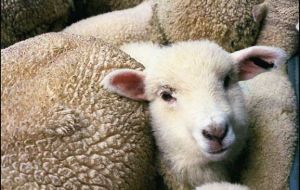MercoPress. South Atlantic News Agency
Falklands’ abattoir prepares for 2013 season; FIMCO officials to Paris food show
 Last season 47.200 sheep and lambs were processed
Last season 47.200 sheep and lambs were processed The Falkland Islands Sand Bay abattoir is busily in the midst of preparing for the oncoming season, confirmed Assistant Manager Dave Roberts this week. He said there was a small amount of upgrade work to complete, “which couldn’t be done at the start of last export season, and this is expected to be completed in the coming weeks.”
Farmers have begun to send in livestock estimates for the season, with a return of 33% in so far; about normal for this time of year.
Roberts said The Department of Agriculture and FIMCo have been speaking to cattle suppliers, and have held “several workshops to gain an increase in the cattle numbers available and also look at export beef.”
Packaging, labels, pallets, salt and personal protection equipment for the season are currently being ordered to make the vessels in time for early December.
He added, “We undertake maintenance throughout the season, however after the export season, annual maintenance is carried out on all items of plant and machinery, which also involves ordering specialist materials from the UK and Chile”.
General Manager John Ferguson and Production Manager Nigel Leach will attend the SIAL food fair in Paris during October, “there we have the opportunity to meet up with our most export customers, obtain feedback on the season and discuss the 2013 season with existing and prospective customers”.
“Due to the euro-crisis continuing, we continue to actively look at developing products in our EU and non-EU markets to spread the risk and benefit” said Ferguson.
Last year despite some logistical issues in the early part of the season the FIMCO completed a record breaking high season on April 27, with 47,200 sheep and lambs processed and over 540 tons of meat and offal produced, earning farmers more than £1million for their animals.
At the time General Manager Ferguson said that productivity was increased by over 40% per day on average rising from approximately 550 in 2011 to 750-800 plus in 2012. Furthermore 43.800 (93%) of the skins were salted and shipped to Hong Kong in China and 46,500 (98%) casings and small intestines were processed and shipped to Egypt.
In related news the Falklands established that shearing sheep in April is no longer allowed, except for animals going for immediate slaughter, following an amendment to the Code of Practice for the Welfare of Sheep.
The change to shearing dates was recommended by the Director of Mineral Resources and the Senior Veterinary Officer in order to reduce the effects of poor weather and poor nutrition on the condition of the sheep during the short Falklands growing season and received no opposition from the farming community.
Shearing is permitted from November 1 to February 28 using standard combs. Cover combs must be used from September 15 until October 31 and from March 1 until March 31. If small numbers of stragglers (sheep which escaped earlier round-ups) need to be shorn in April the farmer should first contact the veterinary section to give notice of his intention to shear. All sheep shorn in April must be shorn using cover comb. (Penguin News).-




Top Comments
Disclaimer & comment rules-

-

-

Read all commentsI take my hat off to you John and Nige and the rest of your team; MattJeep and Co. You guys have worked so hard to turn this around from something 8 years ago that was given no hope by most.
Sep 12th, 2012 - 07:46 pm 0WELL DONE.
They're sheep so they must be Argentine. How dare you steal even more of their resources.
Sep 13th, 2012 - 06:01 am 0Now that you have a shiny new abbatoir and ships exporting meat, when will I be able to buy Falkands Lamb in Sainsburys in the UK?
Sep 13th, 2012 - 06:20 am 0Is there potential to drastically increase livestock levels in the Islands or is the land too poor?
No2: That's no way to refer to the Argentinians.
Commenting for this story is now closed.
If you have a Facebook account, become a fan and comment on our Facebook Page!